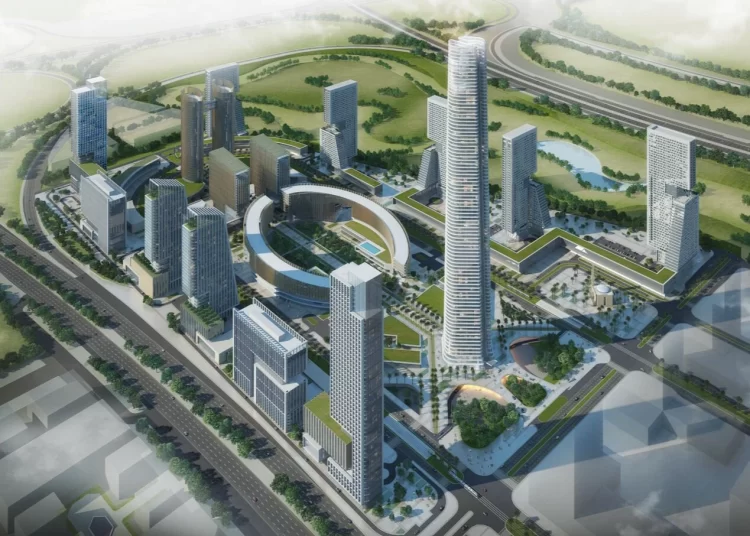Egypt and China have signed a number of agreements to deepen their co-operation during President Abdel-Fattah El Sisi’s visit to Beijing last week.
The president, accompanied by Egyptian Foreign Minister Sameh Shoukri, witnessed the signing of these agreements with Chinese President Xi Jinping in a ceremony that coincided with the 10th anniversary of the Egypt-China comprehensive strategic partnership.
The agreements include collaboration in China’s Belt and Road Initiative(BRI), which brings Chinese companies to build Chinese-funded transportation, energy, and infrastructure projects overseas.
China invested billions of dollars in Egypt’s national development projects, including the Suez Canal Economic Zone and the new Administrative Capital east of Cairo.
Egyptian-Chinese joint investments totaled $14 billion in 2023, compared to $16.6 billion in 2022, according to data from the state-run Central Agency for Public Mobilisation and Statistics (CAPMAS).
Egypt and China have a long history of diplomatic relations, dating back to the 1950s. Egypt was the first Arab and African nation to establish diplomatic relations with the People’s Republic of China in 1956.
In December 2014, shortly after taking office, President Sisi made an official visit to China where he met President XI and signed a comprehensive strategic partnership (CSP) agreement, which has inaugurated a new era of enhanced bilateral relations between the two countries.
Since 2014 President Sisi has visited China several times, during which the two countries signed a substantial number of bilateral agreements. According to CAPMAS, the volume of trade between Egypt and China increased from $11.9 billion in early 2022 to $13 billion in early 2023, an increase of 9.8 per cent in just one year.
Egypt is the largest recipient of Chinese investments in the Arab world. China’s investments in Egypt have reached nearly $7 billion, 90 per cent of which were pumped over the past five years, providing around 40,000 jobs, according to a statement by the Chinese Embassy in Cairo.
Chinese companies have invested billions of dollars in infrastructure projects in Egypt, including the construction of the New Administrative Capital as well as power plants and industrial zones.
Chinese media said China’s keenenss to strengthen its relations with Egypt should also be viewed through the prism of China’s massive BRI. For example, the Suez Canal and Trade Cooperation Zone (SETC-Zone), established in 2008, is considered a key project that significantly serves the BRI due to its location and logistical capabilities.
The SETC-Zone is a major hub for Chinese products, boasting 102 Chinese companies, $1.2 billion of investments, 30,000 new jobs, and over $2.5 billion in sales, according to China’s National Development and Reform Commission.
“There are huge Chinese projects in Egypt, and China is Egypt’s first trading partner, in addition to its huge investments in Egypt,” Finance Minister Mohamed Maeet said in recent press remarks.
Maeet said China’s mega investments, mainly in Egypt’s new administrative capital and the Suez Canal Economic Zone, notably contribute to boosting the Egyptian economy.
“We are partners with China in the Belt and Road Initiative, the BRICS group and the Asian Infrastructure Investment Bank, all of this is in the common interest of the two countries,” Maeetnoted, referring to Egypt’s issuance of sustainable panda bonds in the Chinese financial market as a testament to bilateral co-operation.
Minister of Public Business Sector Mahmoud Esmat has recently said that there are 36 economic projects on which the ministry is currently co-operating with the private sector, adding that many of these projects involve large Chinese companies.
Esmat revealed that the ministry has been working to highlight investment opportunities in Egypt to attract local and international investors, especially Chinese investors. According to him, Egypt opens the door for Chinese investments and trade with the Middle East and North Africa (MENA).
China-Egypt relations
China and Egypt, among the world’s most ancient civilizations, have had friendly relations for a long time. At the pivotal 1955 Afro-Asian Bandung Conference in Indonesia, the former Chinese premier Zhou Enlai and late Egyptian president Gamal Abdul Nasser established the foundation for contemporary Sino-Egyptian relations.
Since then, Egypt has increasingly gained relevance in the Chinese government’s Middle Eastern strategy and is seen as a key force with strategic importance in the Arab world, Africa, and developing countries.
Egypt was the first nation from Africa, the Middle East, and the Arab world to forge official diplomatic ties with China in 1956.






Discussion about this post